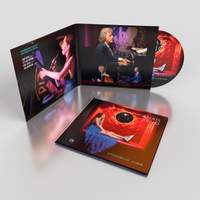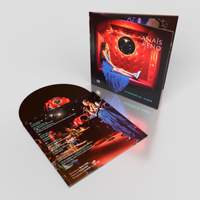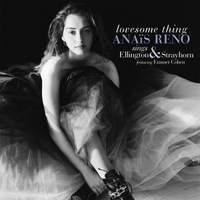Interview,
Anaïs Reno - And So It Goes...

Hi Anaïs, how did last night's gig go?
It was a really fun experience! The band was really wonderful because we only rehearsed a couple hours before. We didn't even get to go over every single tune, I had to prioritise which ones needed the most work. It's the same band as the record [and the first time we’ve played since recording the album], which was nice. By no means does it feel like we’ve only worked together twice, because I feel very comfortable with them; they have a way of making you feel that. They're super nice, chill and flexible.
What made you want to record a live album, and who approached who?
The label approached me. I had this gig with Harold Sanditen, who approached the Pizza Express guys because he knows them. He said, ‘Hey, come to this gig that I'm having Anaïs on. She's singing a few tunes with this pianist, Pete Malinverni.’ They came and, luckily enough, they were interested in making a record. This is a relatively new endeavour that they've embarked on, so I feel very lucky that they wanted to include me in it. And, of course, they put out live records, which I’ve never done before. It's very different from a studio record because you need some sense of flexibility, but you also have to balance that with the fact that you know you only have one take… However the audience receives it is how they're going to receive it – and you can't change that! I had to let go of some perfectionism in my head, there. But, it's been a very informative and important experience for me, personally, also just in terms of being able to work with these musicians.
How big a role did the PizzaExpress audience play in shaping your performance?
They clap and such, because they're very respectful. I guess that's the difference between an American audience and coming here – American audiences are very intense! There's nothing wrong with that, but I think there's a lot more cheering in the middle of a song. Maybe, you've just done some really deep, dark ballad. You've just finished the first chorus, somebody’s taking a solo that's particularly quiet and intimate, then someone just goes, 'Wooh!!!'... I wouldn't say that I find that as much here, and, honestly, I think I’m more like that, because I'm also a more reserved audience member. I can think that someone's the best musician in the world and I'll just *claps politely* - I'm pretty quiet! It's not that one is better or worse than the other, it's just different. You'll hear clapping and the occasional nod because someone recognizes the song or their mother sang it to them when they were a child but, for the most part, it's a very respectful and well-organised experience.

I wonder if our 'British reservedness' might affect your performance in any way?
It doesn’t deter you from the experience though, the audience is a huge part of it. I remember over the pandemic, when the whole virtual performance thing was out and about, you had the live aspect of it but no audience. And, the audience is what gives you the adrenaline, what gives you the energy. Of course, you can't 100% rely on that, you do need to bring something to the table and to have some sort of idea of what you're doing, but I find that the audience gives me the freedom, a lot of the time, to try different things out. To have a certain energy on a tune that maybe I hadn't expected was going to happen, that combined with having a band that works with you instead of behind you, all of that creates a live experience, which is why it was so nice to have a live record, because there's no way that you can fully capture that in anything but a live space!
Judging from the tracklisting, it seems you build setlists of songs that interest you on a personal level. Tell us more about how you gathered repertoire for this recording?

I think that the mixture stems from the difference in mentality that I've developed about this music ever since I first started recording music a few years ago. I talk about this in the liner notes: it's very easy, especially as a young person in any sort of artistic medium, to feel that everything has to be within one confine and feel, okay, well, it's not worth my time unless it's super deep and down on myself, the music. Or, unless it's some deep cut from a who-knows-what album to prove that I know this artist that nobody else knows, it's not worth it; I'm gonna get an eye roll! And, I have to admit that I have fallen into that jaded mindset in the past. I think over the last couple of years, particularly being in college, I have started to understand that there is great importance in joyful music, regardless of how well or little-known it is. And so, when picking this album, I was thinking less about ‘How well known is this? How obscure is this? Who’s the composer? Is this going to prove that I know something that the audience doesn't?’, and more the kind of arc this is going to create for the record. Can the darker music (which is definitely on there) be more of a textural effect, rather than the one intent I'm trying to provide? Because, in the past, I think that was the case, but now I'm trying to grow out of it.
So, it sounds as if you’ve adopted an almost ‘non-judgemental’ approach by just picking tunes that resonate with you?
In a way... I mean, of course, everyone knows ‘The Girl from Ipanema’. You don't need to know jazz for that. ‘It's De-Lovely’, I've known that one for a long time, which is funny because I used to not like it at all! Even a year and a half ago, I thought it was too cutesy for me. No, it's not – it's fun! Why does it have to be more complicated than that?
There's much to be said of the vibrancy of this album's cover. Is it safe to say it’s a good visual representation of your personality?
It very much captures the album’s mood because it's curious, which aligns with how I felt because I didn't know what to expect. I’d never done a live album, and also, I was trying to be more open with my song choices, mentally. But, there’s also a little bit of a saturation about it on the corners, like a darkness, too. Not that this is a dark album, but there are notes of that in there… So, I would say yes; I hadn't even thought about that! Curiously saturated – there's a phrase!
I particularly enjoyed your combination of a blue ball gown with Converse sneakers Did you wear those shoes on the gig?
I didn't, no. That wasn't even planned for the photo; I came out in a dress and was like, ‘Okay, I'll change into the heels outside,’ because I don't tend to wear dress shoes outside, casually… Usually, it's just on the gig. And, they were blue, which was, serendipitously, a kind of interesting, unexpected match!
Your repertoire contains Brazilian and French songs as well as English. How do you find having to balance emotion and vocal technique when it comes to performing in other languages?
You’ve already appeared across some of the most prestigious jazz venues in America. How does it feel to perform in these hallowed spaces?
I feel very lucky to have been able to even see these clubs, let alone perform at them; they're just stunning. There's a lot of stuff like that where maybe you wouldn't call them formal jazz venues, but they're still very enjoyable to sing at because the people there just want to hear music. At the end of the day, that's what fuels the atmosphere. It's very inviting and they want you there, then you want to be there!
I love exploring the way jazz is embedded in the culture over there, particularly in a live context.
I agree, it's fascinating. For me, I started in jazz because that's what felt right and that's what was recommended to me. But, I mean, if you look at the history of when jazz was being created through all of these musicians/composers and the passion that they had, they were creating it because they needed it. It's a privilege to be able to go to school for jazz; to be able to pay to learn music is a certain privilege that a lot of people who were originating it didn't have. They made it because they felt in their bones that that's what made sense for them. The people who originated this music started it out of emotional necessity and, of course, with musicians today, they aren’t doing this to make a million dollars a year, they're doing this because they love it and because it calls to them.
Speaking of which, what was your musical training like and how did your calling begin?
I started aged 8 with a voice teacher at the 92nd Street Y. Based on what she sensed about the way I sang, it gave her the impression that standards would be interesting for me. She eased me into it, she wasn’t like, ‘Here's Donna Lee, transcribe this’, you know? But, she had me do ‘Smile’ and ‘All Of Me’, stuff that would at least give me an idea of what it was about. I latched on to it over time, and I think it very quickly became a norm. It didn't feel like some big switching point or a decision to make; it just happened and, ever since then, that's been my main trajectory. These days, I'm trying to be more flexible; less about the label, and more so about what speaks to me.
Is that why you chose to include Billy Joel amongst a fine setlist of jazz standards?
Well, actually, Pete [Malinverni] was the reason that I first heard that song. I was in the jazz choir last year at school, and he brought in an arrangement. Before we sang it or even sight-read the parts, he read the lyrics to us. I was having an iffy day, so I was a little bit, I'll say, ‘emotionally vulnerable’. I’m not much of a crier when it comes to music – I'll listen to songs and be moved, but rarely do I think, ‘Oh, a tear has fallen!’ But, I was getting there, because the lyrics are so simple but so effective. You can tell, and Pete was saying this as well, that the person who wrote them has seen something and it's so moving and stunning. Admittedly, the type of lyric and songwriting that I am attracted to is a lot more dissonant than what ‘And So It Goes’ provides to the ear. So, I was surprised that I was as touched as I was, but it's just an incredible song. I remember thinking as soon as we did it, I didn't even know what my key would be or if it would suit me vocally, but I said to Pete, ‘Can we do that in London?’ It's just a wonderful song. It didn't even occur to me to think about it further; it really was obvious.
That makes me wonder if you've ever tried your hand at songwriting?
You know, if you asked me that three months ago, I would have said not really. But, recently, yes! Actually, for the first time last night, I performed a song that I recently wrote on the gig. At first, it made me nervous, because I don't do that a lot. I'll get ideas sometimes for melodies or lyrics, because I do like writing prose and lyrics, but nothing that I've fully fleshed out into a completed song. I've found that it's quite cathartic, because anything that I might be feeling about a particular situation that I've written about in a song, whether positive or not, if anything externally tries to interfere with me emotionally, at least I know that it's something that's mine. Regardless of whether I've shared it with anybody, that's something that can't be taken away from me. That’s my baby, you know?
How it would feel if you were to write music then revisit it further down the line, what sort of aspects do you think you’d have to reflect on?
It's interesting. All songwriting does is reveal something to you, but at the same time, I think that what it does is change, but that's the way in which it never changes. It can develop over time into something different, but that’s what is completely consistent about it.








